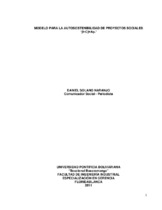Modelo para la autosostenibilidad de proyectos sociales ´[l+C]=AP.'
Fecha
2013-11-05Autor
Solano Naranjo, Daniel
Director/Asesor
Jaimes Hernández, Raúl
Tipo de contenido
book
Citación
Metadatos
Mostrar el registro completo del ítemDocumentos PDF
Resumen
El modelo ‘[I+C]=Ap.’ corresponde a un proceso donde se desarrollan tres variables. La variable ‘identificación’, concebida como la representación que alcanza un sujeto o colectivo con una idea, problema, objetivo, etc. La variable ‘conocimiento’ entendida como un ciclo comunicativo que tiene el objetivo de equilibrar en el colectivo los significados y significantes que se comparten sobre un tema. Y por último, la variable ‘apropiación’, la cual es el producto de la intersección entre la identificación y el conocimiento, reflejada en las acciones de un sujeto-colectivo respecto a un proyecto, herramienta, idea, filosofía, cultura, entre otros. Estas variables corresponden a etapas en el desarrollo del modelo. La etapa de ‘identificación’ incluye: una convocatoria de participantes; la definición de un problema por parte del colectivo partiendo de necesidades individuales; y la concertación de un objetivo común. La segunda etapa definida como ‘conocimiento’ contempla el desarrollo de juicios de expertos donde se examinan datos sectoriales estadísticos, históricos, culturales, sociales etc. con el problema definido en la etapa de identificación, dando como resultado una concertación enriquecida de percepciones y argumentos. Dentro de esta etapa también se estudia la herramienta a emplear para el tratamiento del problema, la cual debe contemplar elementos jurídicos, autosostenibles, culturales y de impacto. Por último, en la etapa de ‘apropiación’ se realiza un proceso evaluativo basado en los resultados (producto) de la aplicación de estrategias, proyectos, planes y programas, los cuales miden el compromiso del colectivo entre otros factores. En conclusión, el modelo plantea una propuesta para garantizar y medir la sostenibilidad de proyectos desde un plan de formación, contemplando las tres variables enunciadas que se articulan al proceso. The model ‘[I+C]=Ap.’ corresponds to a process where we develop three variables. The variable 'identification', conceived as the representation reaches a collective subject with an idea, problem, objective. The variable 'knowledge' is understood as a communication cycle that aims to balance the collective significant and significations that are shared on a subject. Finally, the variable 'appropriation', which is the product of the intersection between the identification and knowledge reflected in the actions of a collective-subject about a project, tools, idea, philosophy, culture, among others.
These variables correspond to stages in the development of the model. The stage of 'identification' includes: a call for participants, the definition of a problem for part of the collective group based on individual needs, and the concertation of a common goal.
The second stage defined as 'knowledge' includes the development of expert opinions that are dealing with sectoral data statistical, historical, cultural, social etc. the problem defined in the identification stage, resulting in a concertation enriched of perceptions and arguments. Within this stage is also studying the tool to be used for the treatment of the problem, which should contemplate the legal elements, self-sustaining, cultural and of impact.
Finally, at the stage of 'ownership' is carried out an evaluation process based on the results (product) of the implementation of strategies, projects, plans and programs, which measure the commitment (of the collective) among other factors.
In conclusion, the model presents a proposal to ensure and measure the sustainability of projects from a formation plan, considering the three variables set that articulate the process.
Palabra/s clave
Ingeniería industrial
Tesis y disertaciones académicas
Gerencia
Evaluación de proyectos
Colecciones
- Trabajos de grado [6698]


